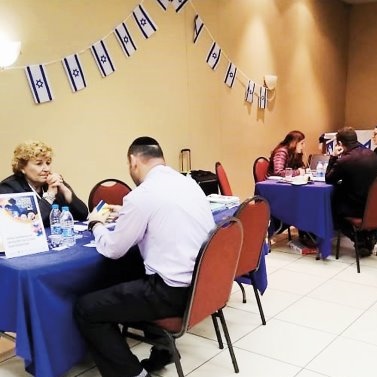
Featured Item

Aliyah Expo gives guidance on settling in comfortably
JORDAN MOSHE
Befriend the doctor’s receptionist, ask her about her family and her simchas, and she is sure to help you in your hour of need.
This is just some of the advice shared by social worker Tova Rubenstein at this year’s Aliyah and Higher Education Expo. Rubenstein was invited by the Israel Centre to South Africa to discuss the aliyah process with community members this week.
Emigrating to Israel is no walk in the park, with cultural differences, linguistic challenges, and employment availability being only some of the difficulties one can encounter. The consultations and lectures offered this week offered expert insight into what it really takes to make it in the Holy Land, and perhaps went some to softening the landing.
“Information is definitely power,” says Rubenstein. “We base our lives on what we know. We know how things operate around us, how to go about our lives – how to obtain a medical script, make a doctor’s appointment, or pay a bill. When we don’t know how to do these things, it can be very frustrating, and we can feel stupid.”
Rubenstein made aliyah from Johannesburg 17 years ago with her husband and children after working in education for 13 years. When she arrived in Israel and found that her skills were not in demand, she fell back on her early training as a social worker 13 years after arriving. Today, she offers an advocacy and care-management service, helping olim (immigrants) to navigate their absorption, and understand the social welfare and medical offerings.
She stresses that anyone making aliyah needs to be aware of their rights, and create a network of connections to help make absorption easier.
“You need a community,” she says. “It could be a shul or even a cycling club. You need to look out for people in a similar situation, build a network, and be willing to ask questions. There is no such thing as a stupid question regarding aliyah.
“Israelis pay 28% of their wage to a medical tax and national insurance,” she says. “You pay in and take out when you need it at different points in life, be it for frail care, maternity, or disability.”
Medical services are offered by four different service providers, all of which fall under the umbrella of the national health insurance scheme. They offer the same basic basket of services such as general practitioners, certain medications, specialist consultations, and immunisations. You have the freedom to choose the provider you like best.
She stresses that you need to take into account any pre-existing conditions, and read the fine print when it comes to medical expenses. “Supplementary packages sometimes give discounts or returns on certain expenses,” she says.
Alongside healthcare, education is another area of concern for many olim. Revital Dotan, the representative of the Israeli education department says that as culturally different as the school system may be, its role in the aliyah process for youngsters is crucial.
“Children in Israel are determined to go to school, but more for their friends than the actual lessons,” she laughs. “The sense of community that school offers children in Israel is very unique, and can be important in helping children to integrate into society.”
She explains that the schooling system offers three different streams: state, state religious, and ultra-orthodox. The type of environment in which you want your child to learn is a decision that must be taken well in advance. “The streams are very different and cater for different needs,” she says. “You need to know what sort of school you want for your child, and make a decision before-hand.”
Whatever stream you choose, there are numerous accommodations made for new student olim. Every student oleh receives ulpan classes as part of his schooling, taking lessons during school hours.
They are allowed the use of dictionaries in exams, their spelling errors are overlooked (no marks are deducted) and they get extra time and have their exam questions read aloud if they need it.
In the event of failing one matric subject, students have the chance to rewrite one final exam. “You don’t need to retake the whole year or wait a long time to rewrite,” explains Dotan. “If you fail one subject, that is the only one you will need to improve on and rewrite. It happens within a few months, and after you pass, you can continue with tertiary studies.”
Dotan stresses the importance of early aliyah when children are involved. “The sooner integration into the education system happens, the better,” she says.




